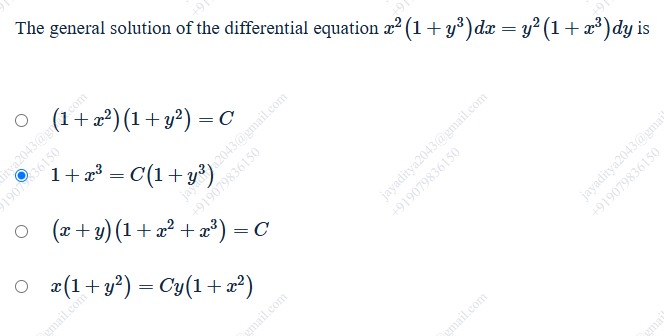Question
Question: The general solution of the differential equation $x^2(1+y^3)dx = y^2(1+x^3)dy$ is...
The general solution of the differential equation x2(1+y3)dx=y2(1+x3)dy is

(1+x2)(1+y2)=C
1+x3=C(1+y3)
(x+y)(1+x2+x3)=C
x(1+y2)=Cy(1+x2)
1+x^3 = C(1+y^3)
Solution
The given differential equation is x2(1+y3)dx=y2(1+x3)dy. This is a first-order differential equation. We can separate the variables x and y.
Divide both sides by (1+x3)(1+y3), assuming 1+x3=0 and 1+y3=0:
(1+x3)(1+y3)x2(1+y3)dx=(1+x3)(1+y3)y2(1+x3)dy
1+x3x2dx=1+y3y2dy
Now, integrate both sides:
∫1+x3x2dx=∫1+y3y2dy
For the integral on the left side, let u=1+x3. Then du=3x2dx. So x2dx=31du.
∫1+x3x2dx=∫u1(31du)=31∫u1du=31ln∣u∣+C1=31ln∣1+x3∣+C1.
For the integral on the right side, let v=1+y3. Then dv=3y2dy. So y2dy=31dv.
∫1+y3y2dy=∫v1(31dv)=31∫v1dv=31ln∣v∣+C2=31ln∣1+y3∣+C2.
Equating the results of the integration:
31ln∣1+x3∣+C1=31ln∣1+y3∣+C2
31ln∣1+x3∣−31ln∣1+y3∣=C2−C1
31(ln∣1+x3∣−ln∣1+y3∣)=C3, where C3=C2−C1 is an arbitrary constant.
31ln1+y31+x3=C3
ln1+y31+x3=3C3
1+y31+x3=e3C3
1+y31+x3=±e3C3
Let C=±e3C3. Since C3 is an arbitrary constant, e3C3 is an arbitrary positive constant. Thus, C is an arbitrary non-zero constant.
1+x3=C(1+y3), where C=0.
